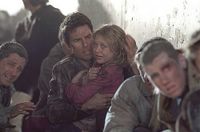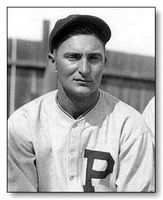Osama bin Martian?
While it is my fervent belief that War of the Worlds just might be the most nifty thrill ride I've been on since my college days when I found myself at Disneyland and loaded out of my gourd on Mr. Toad's Wild Ride, not everyone is so impressed.
Stephen Whitty of the New Jersey Star-Ledger bashes director Steven Spielberg and screenwriter David Koepp for depicting an on-screen alien invasion with more than a few reminders of the horrors of 9/11:

" In War of the Worlds, Steven Spielberg has not only seized the iconography of that event, he's appropriated it to sell a popcorn entertainment about alien invaders, and encourage our own fears of the strangers among us," Whitty writes. "It's difficult to know whether to be astounded by the immensity of his audacity or to be merely appalled."
The Star-Ledger goes on to question Koepp's previous insistence that the movie does not have a political agenda:
" ... Screenwriter David Koepp insisted the film would be sensitive to 9/11 memories. He claimed it had been set in New Jersey chiefly to take advantage of working-class backgrounds. He suggested that the story had no agenda, and that it could be read just as easily as a protest against the Iraq war.
"And yet if a blue-collar milieu was all that was needed, why not set the film in Milwaukee, or Cleveland? If a pacifist reading was ever possible, why is the one character who talks about the evils of occupation seen as a madman (and eventually, rather coldly, dispatched)? If the film means to be respectful of our memories, why does it exploit them simply to ratchet up the scares?"
Although I don't buy Whitty's suspicions about why the film takes place in his beloved New Jersey -- hell, Orson Welles' 1938 radio broadcast took place in Grover Mills, N.J., so surely this latest version is allowed to at least pay that much of an homage -- there is certainly no disputing that Spielberg's version is eerily reminiscent of 9/11 images.
In this War of the Worlds, buildings fall, bridges snap like toothpicks and an airplane crashes into a neighborhood. As the death count piles up, scores of clothes come wafting down. We see victims vaporized in a matter of seconds. Handbills are plastered with pleas from desperate families searching for missing loved ones. Survivors of the destruction find themselves covered in a sickening ashen soot.
Whitty continues:
"The horror of 9/11 changed us all. It clearly changed Steven Spielberg (whose next project is about the massacre of Israeli athletes at the '72 Olympics). The optimism that once drove E.T. and Close Encounters of the Third Kind has been replaced by a worry that the skies are no longer limitless, that there's a threat 'even in our own backyards,' that the aliens have already infiltrated our urban neighborhoods, where they lie in wait to strike. That this new vision of War of the Worlds says something about a certain state of mind must be admitted.
"But it need not be admired. And its exploitation of tragic iconography -- just to amp up the screams, tug some tears and sell a few more million movie tickets -- should be deplored."
I don't agree with Whitty's assessment, but I understand it. Proximity is everything. While the entire nation suffered the tragedy of 9-11, there is no way those of us west of the Mississippi River approached the grieving of New Jersey, which lost nearly 700 citizens in the World Trade Center attack. The psychological wounds, understandably, are still fresh there. I still remember a mix of revulsion and anger when I saw 1998's The X-Files movie, which offered a variation on the Oklahoma City bombing for the service of plot points.
But art, regardless of the medium, always has -- and always will -- reflect the particular fears and ideals of its time. That is the domain of meaningful art, even -- and perhaps especially -- when it is so-called "mass" entertainment. And H.G. Wells' 1898 novel has proven itself especially malleable to accommodating the nightmares of different generations. While the Orson Welles version echoed Hitler's sweep through Europe, Hollywood's 1953 take on The War of the Worlds mirrored Cold War and McCarthyism anxieties.
If you're making an alien invasion flick in 2005, what real-life fears could possibly supplant the specter of terrorism?























1 Comments:
that criticism is unwarranted, and dangerous, if heeded
the very horror of 9/11 was amplified by the everyday nature of what was at hand--planes and cities. it's hard to delete all of that from future thrillers, alien or otherwise.
in a weird way, i found this film oddly comforting. it was revisiting the horror, chaos and fear of 9/11 but knowing that this drama would not, could not ever happen.
now when movies about dirty bombs and suicide bombers come out, my story might change.
as it is, this was a buckled-in thrill ride of fun. plot holes, to be sure (why, for instance, did all of these people run toward cities? i kept thinking: head to amish country...you can live there untouched forever). but it's a thumbs up, even for someone who usually steers clear of action and sci-fi
Post a Comment
<< Home